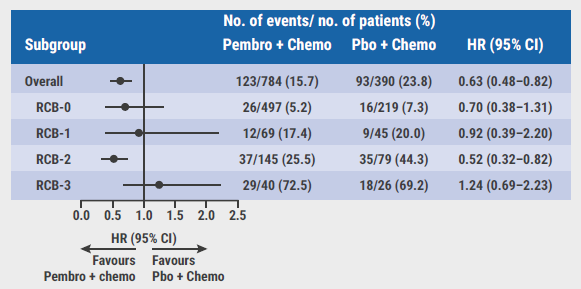https://doi.org/10.55788/2c7c62f7
The novel SET2,3 genomic test, which measures non-proliferative HR-related transcription, has been validated as a prognostic tool for DFS in patients with ER-positive breast cancer after neo-adjuvant therapy [1]. The ROR-PT and PAM50 intrinsic subtype tests could not predict which patients would benefit from dose-dependent chemotherapy in a previous study [2]. To this end, Dr Otto Metzger (Dana-Farber Cancer Institute, MA, USA) and colleagues aimed to assess the prognostic performance of SET2,3 in patients with ER-positive breast cancer in the phase 3 CALGB9741 trial (n=613; NCT000030880) [3].
A high SET2,3 score was associated with an improved 5-year DFS compared with patients with a low SET2,3 score (86% vs 73%; HR 0.47; 95% CI 0.35–0.64), causing the primary endpoint of this study to be met. Similar results were obtained for the 5-year OS rates (95% vs 85%; HR 0.38; 95% CI 0.27–0.54). Moreover, the prognostic value of SET2,3 was still significant (P<0.0001) after controlling for ROR-PT, showing that SET2,3 is adding independent prognostic value. Furthermore, a significant interaction effect was observed between SET2,3 score and the choice of chemotherapy on DFS (Pinteraction=0.098). In patients with lower SET2,3 scores, dose-dependent chemotherapy would be the preferential option, whereas those with higher SET2,3 scores seem to benefit more from conventional chemotherapy. The interaction effect was even stronger when the investigators looked at OS outcomes (Pinteraction=0.027) and remained significant after controlling for HER2 status.
“The future of SET2,3 may allow us to identify patients who would benefit from dense intense chemotherapy and/or adjuvant abemaciclib,” reasoned Prof. Erica Stringer-Reasor (University of Alabama at Birmingham, AL, USA), discussant of this trial. “However, validating this assay in future prospective and retrospective trials is warranted.”
- Du L, et al. Ann Oncol. 2021;32(5):642–651.
- Liu MC, et al. NPJ Breast Cancer. 2016;2:15023.
- Metzger O, et al. Measurement of endocrine activity (SET2,3) related to prognosis and prediction of benefit from dose-dense (DD) chemotherapy in estrogen receptor-positive (ER+) cancer: CALGB 9741 (Alliance). Abstract 505, ASCO 2022 Annual Meeting, 3–7 June, Chicago, IL, USA.
Copyright ©2022 Medicom Medical Publishers
Posted on
Previous Article
« Metastasis-directed therapy fails in oligometastatic breast cancer Next Article
Practice-changing results of T-DXd in HER2-low breast cancer »
« Metastasis-directed therapy fails in oligometastatic breast cancer Next Article
Practice-changing results of T-DXd in HER2-low breast cancer »
Table of Contents: ASCO 2022
Featured articles
Breast Cancer
Sacituzumab govitecan meets primary endpoint
Shaky OS results of palbociclib in ER-positive/HER2-negative breast cancer
Practice-changing results of T-DXd in HER2-low breast cancer
SET2,3 to inform on chemotherapy decisions in ER-positive breast cancer
Metastasis-directed therapy fails in oligometastatic breast cancer
Analysis by residual cancer burden further clarifies effect of pembrolizumab
Contribution of metastatic therapies on mortality reduction in breast cancer
Radiotherapy may be omitted in breast cancer patients
Promising data for ribociclib after progression on ET plus CDK4/6 inhibitors in HR-positive/HER2-negative metastatic breast cancer
7-gene biosignature: Benefits of endocrine therapy and radiotherapy in breast cancer risk groups
Lung Cancer
Additional tiragolumab does not help patients with untreated small cell lung cancer
Success for serplulimab plus chemotherapy in small cell lung cancer
Adagrasib safe and clinically active in non-small cell lung cancer
Long-term benefits of combined immunotherapy over chemotherapy in non-small cell lung cancer
Effect of KRAS mutations and PD-L1 expression on therapy response in non-small cell lung cancer
Melanoma
First results on distant metastasis-free survival in stage II melanoma
Higher response rates for concurrent triple therapy versus sequential therapy in melanoma
Genitourinary Cancers
Exploratory treatment options fail in ccRCC
Adjuvant everolimus did not benefit high-risk renal cell carcinoma
Cabozantinib fails as first-line maintenance therapy in urothelial cancer
177Lu-PSMA-617 is a valid treatment option for PSMA-positive mCRPC
Enzalutamide performs well in metastatic hormone-sensitive prostate cancer
Haematologic Malignancies
Autologous stem cell transplantation plus RVd improves PFS in multiple myeloma
Novel first-line treatment option for mantle cell lymphoma
Promising results for novel CAR-T therapy in relapsed/refractory multiple myeloma
Gastrointestinal Cancers
Panitumumab beats bevacizumab in RAS wildtype left-sided metastatic colorectal cancer
Spectacular results for dostarlimab in mismatch repair deficient rectal cancer
Triplet chemotherapy beats doublet chemotherapy in colorectal cancer liver metastases
To resect or not to resect primary tumours in stage IV colon cancer?
Novel treatment option for KRAS wildtype pancreatic cancer
Gynaecological Cancers
Primary results of rucaparib in ovarian cancer
Trabectedin not superior to chemotherapy in recurrent epithelial ovarian cancer
Encouraging results of relacorilant in ovarian cancer
Miscellaneous Topics
Bacterial decolonisation effective against radiation dermatitis
New standard-of-care for cisplatin-ineligible locally advanced head and neck squamous cell carcinoma
Ifosfamide is likely to be the go-to therapy in recurrent Ewing sarcoma
Dabrafenib plus trametinib candidates for standard-of-care in BRAF V600-mutated paediatric low-grade glioma
© 2024 Medicom Medical Publishers. All rights reserved. Terms and Conditions | Privacy Policy
HEAD OFFICE
Laarderhoogtweg 25
1101 EB Amsterdam
The Netherlands
T: +31 85 4012 560
E: publishers@medicom-publishers.com



